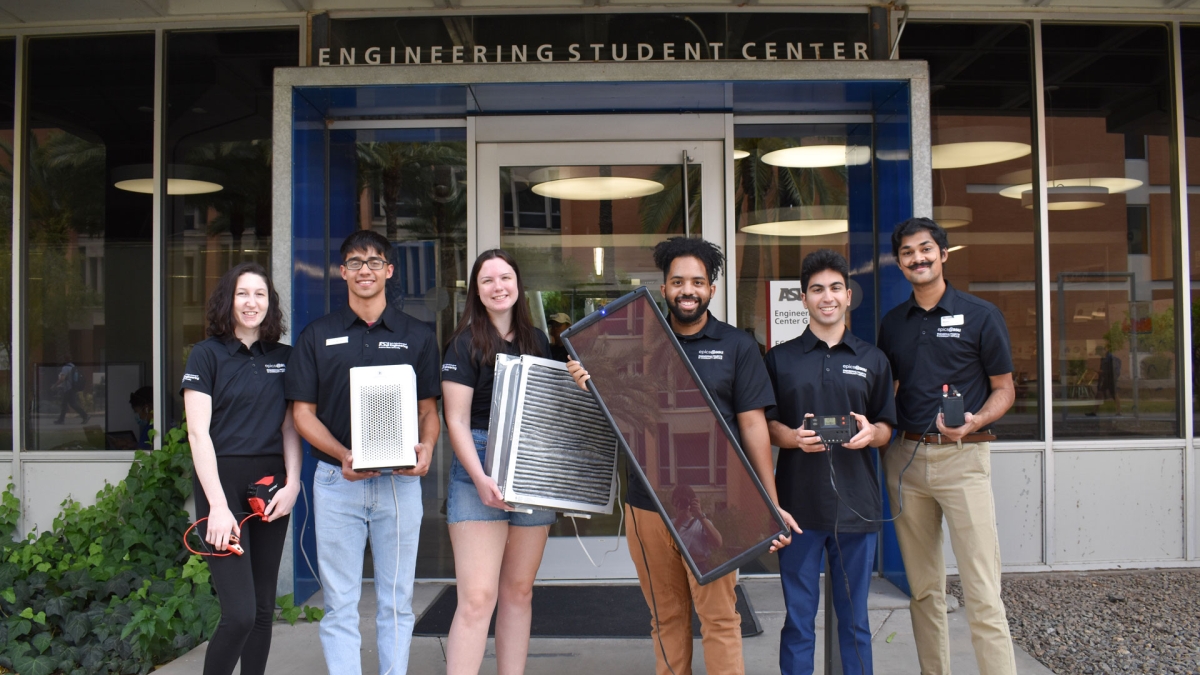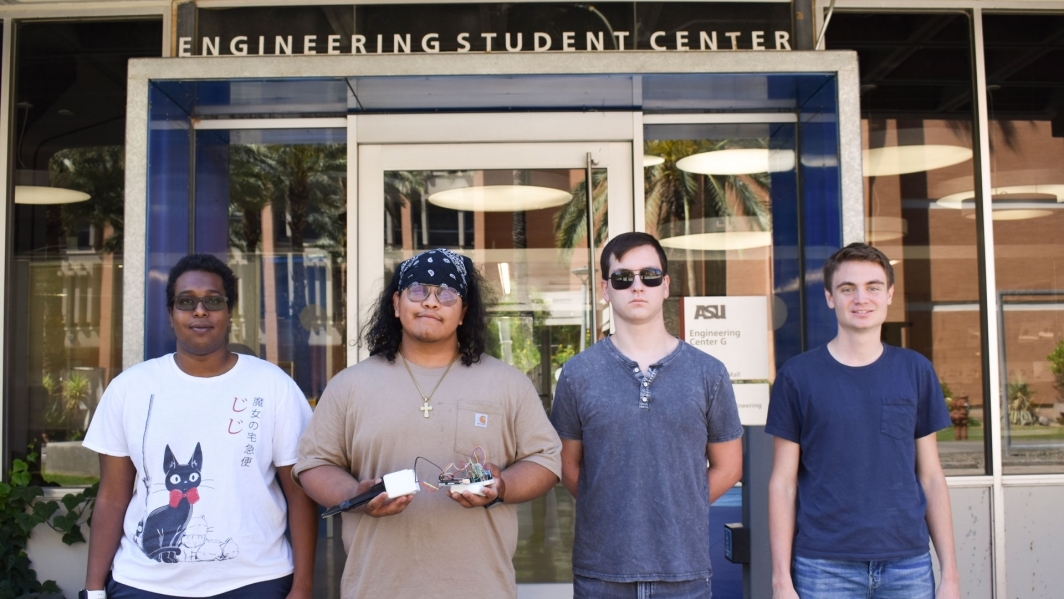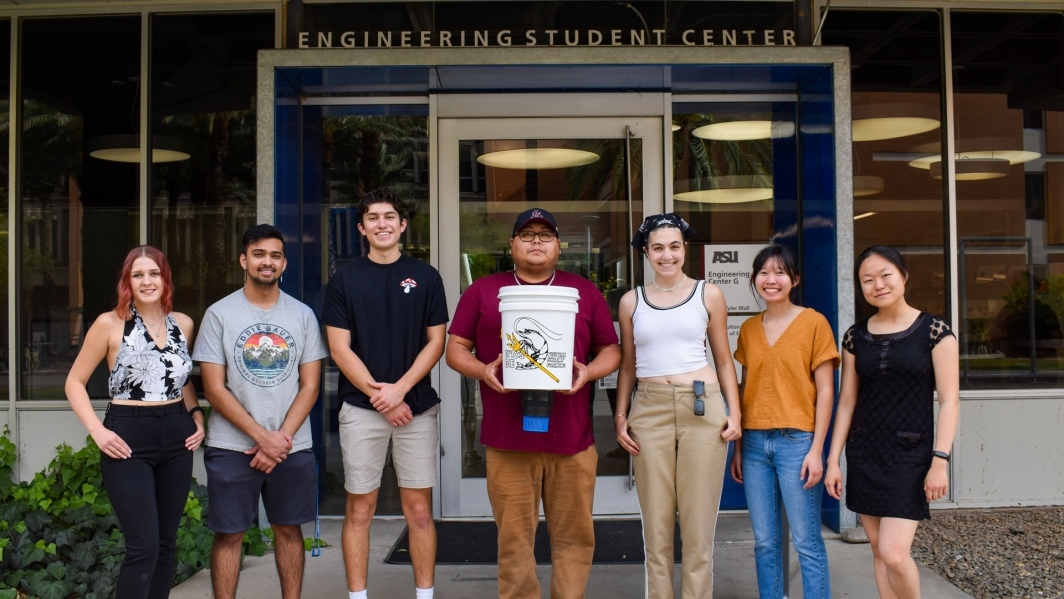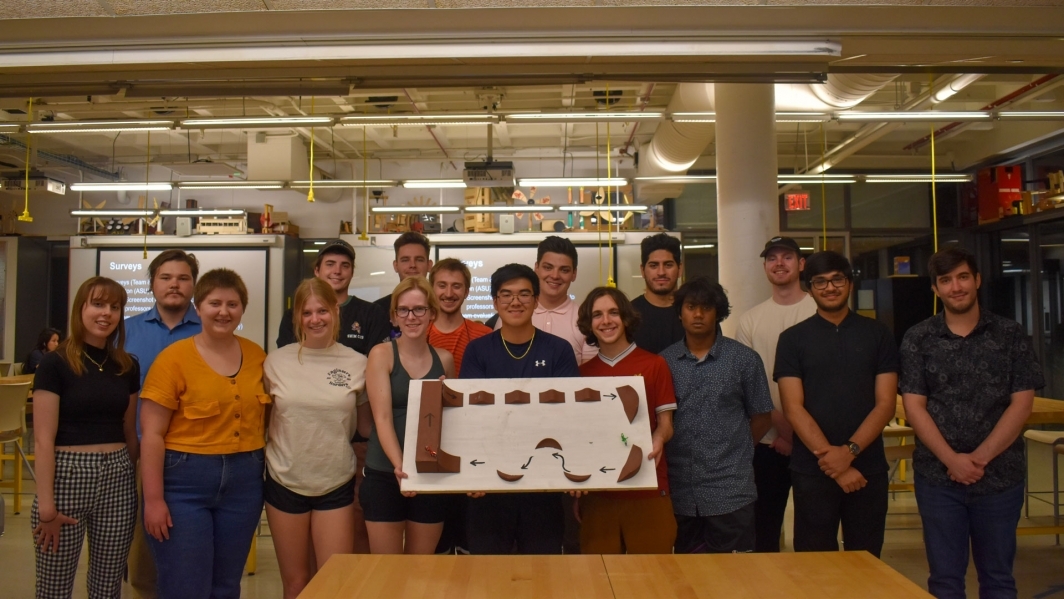EPICS teams earn funding from spring pitch competition

Arizona State University students from the Engineering Projects in Community Service (EPICS) team Project Koyash stand in front of ASU’s Engineering Student Center with their prototype air filter. In this social entrepreneurship program, student teams design, build and deploy systems to solve engineering-based challenges for communities. Pictured from left to right: Sarah Johnston, Tommy Montero, Catherine Johnston, Jalen Goode, Bryan Yavari and Shamsher Warudkar. Photo courtesy Lauren Kobley
Top teams of social entrepreneurship students competed this spring for additional funding to deliver and sustain their innovations in a pitch competition from the Engineering Projects in Community Service, or EPICS, program in the Ira A. Fulton Schools of Engineering at Arizona State University.
On March 30, this national, award-winning, social entrepreneurship program held its EPICS Elite Pitch Competition powered by the eSeed Challenge.
Eight out of the 60 teams in the program competed by presenting their projects to a panel of four expert judges and an audience of students, faculty and industry members. Each team pitched their solution and implementation plan to win part of the $10,000 in funding being awarded that evening.
The judges asked students grueling questions to determine which teams they found most deserving of the award and most likely to deliver their solution within the next six to 12 months. After deliberation, four of the eight teams received funding and their spot as one of the EPICS Elite teams of 2022.
Providing clean air to communities in need
Project Koyash won first place among the teams and was awarded $6,000 in funding. They partner with the Taiwan Fund for Children and Families to provide air filters for nomadic communities in Mongolia. Due to climate change and drought, major food sources have been diminished for these communities in Mongolia, which has forced them to relocate to the overpopulated city of Ulaanbaatar.
Due to petroleum product burning, wood-burning stoves, industrial operations and the large population, the air in Ulaanbaatar has a high amount of air pollution, making it unhealthy to breathe. The team’s goal is to filter the air within the homes of these nomadic communities so that it is safe to breathe. They have delivered one prototype to their community partner in a pilot test to collect data.
The team is now testing their second prototype, which is completely autonomous and will use their new funding from EPICS Elite to create 12 filters — matching the total number of homes they are partnering with — and send them to Ulaanbaatar.
Students Sarah Johnston, Shamsher (Shami) Warudkar, Bryan Yavari, Malone Roark, Aniket Chatterjee, Tommy Montero, Jalen Goode and Catherine Johnston are working hard to successfully reach these goals with the new funding they received.
Sustainable water use in agriculture
The second-place team, Vietnam Smart Agriculture, was awarded a total of $2,500 to help fund their future project expenses. Farming accounts for 13% of Vietnam’s GDP, with 80% of total water use, according to the General Statistics Office of Vietnam. The country is also suffering from inefficient water usage. By partnering with rural farmers in Vietnam, the team is hoping to increase the efficiency and sustainability of water usage.
For their prototype, the team has created a hand-held device that measures different aspects of the soil, such as moisture content, temperature and more. They have also been working on an app for farmers to use to receive alerts about changes in their soil. Their goal is to encourage more sustainable irrigation habits.
The team plans to use their funding to purchase new materials to test the structural integrity of their prototype. Some team members will be traveling to Vietnam in August to collect data and test their prototype.
Monitoring water quality for shrimp farming
The Vietnam Sustainable Shrimp Farming team tied for third place, earning $1,000 in funding. This team partners with Alex Downs, a subject matter expert living in Vietnam, to decrease the mismanagement of aquaculture, specifically shrimp farming.
Poor water quality is a detrimental issue in shrimp farming. Many farmers’ livelihood is based on the successful harvest of their shrimp, and it can bankrupt families if shrimps are diseased because the whole pond they live in must be discarded.
The team is creating a floating device that connects to a smartphone app to alert farmers when there are changes in their pond’s water chemistry. The team said, “It is central to our project to ensure we do not encroach upon their livelihoods and their knowledge of the industry; we would like to respect their experience as farmers, which is an experience that almost none of the current team members have.”
The Vietnam Sustainable Shrimp Farming team strives to give shrimp farmers a tool to allow them to more rapidly react to changing water chemistry. They will be sending several team members to Vietnam in August to see firsthand how their design is working and learn how they could alter it to further benefit the farmers.
The Navajo Mountain Bike Initiative also earned third place and $1,000 in funding. Partnering with Engineers Without Borders, this EPICS team is building a mountain bike circuit trail, also known as a bike pump track, and other bike trails for the Navajo Nation. The team and their community partner are building them on Navajo K-12 school campuses so that they will be available to the students as part of the schools’ physical education program.
The team works with the people of the Navajo Nation to understand their culture and the best opportunities to implement solutions. The cross-country mountain bike trails the team is working on are intended to be the engine for economic development. These trails can be from point to point or in loops. A loop trail might be 1 to 5 miles, whereas point-to-point trails could be up to 15 or 20 miles long.
Such low-impact economic development would enable Navajo residents to live and work on the reservation instead of leaving to find work. The trails are intended to promote tourism and bring in money through parking fees, lodging, food and other sources. They have also received bike and helmet donations from REI.
The team has a trip planned in the fall to bring these bikes and helmets to the community, and they are hoping to start working on their Shonto bike trail next semester. They plan to focus their funding on building bike trails because it is something that will bring in greater income opportunities to the community and be sustainable over time.
More Science and technology

ASU researcher part of team discovering ways to fight drug-resistant bacteria
A new study published in the Science Advances journal featuring Arizona State University researchers has found…

ASU student researchers get early, hands-on experience in engineering research
Using computer science to aid endangered species reintroduction, enhance software engineering education and improve semiconductor…

ASU professor honored with prestigious award for being a cybersecurity trailblazer
At first, he thought it was a drill.On Sept. 11, 2001, Gail-Joon Ahn sat in a conference room in Fort Meade, Maryland.…


